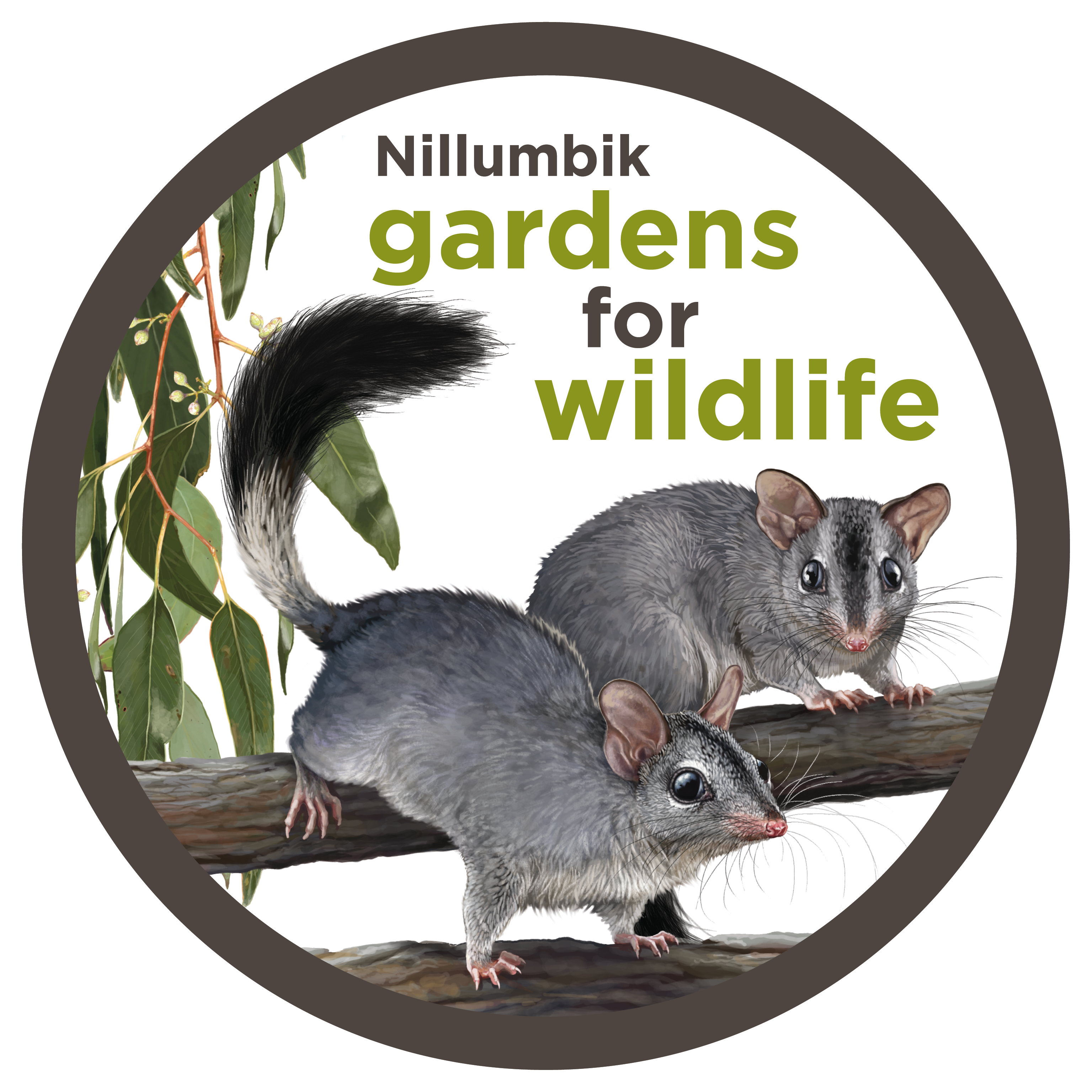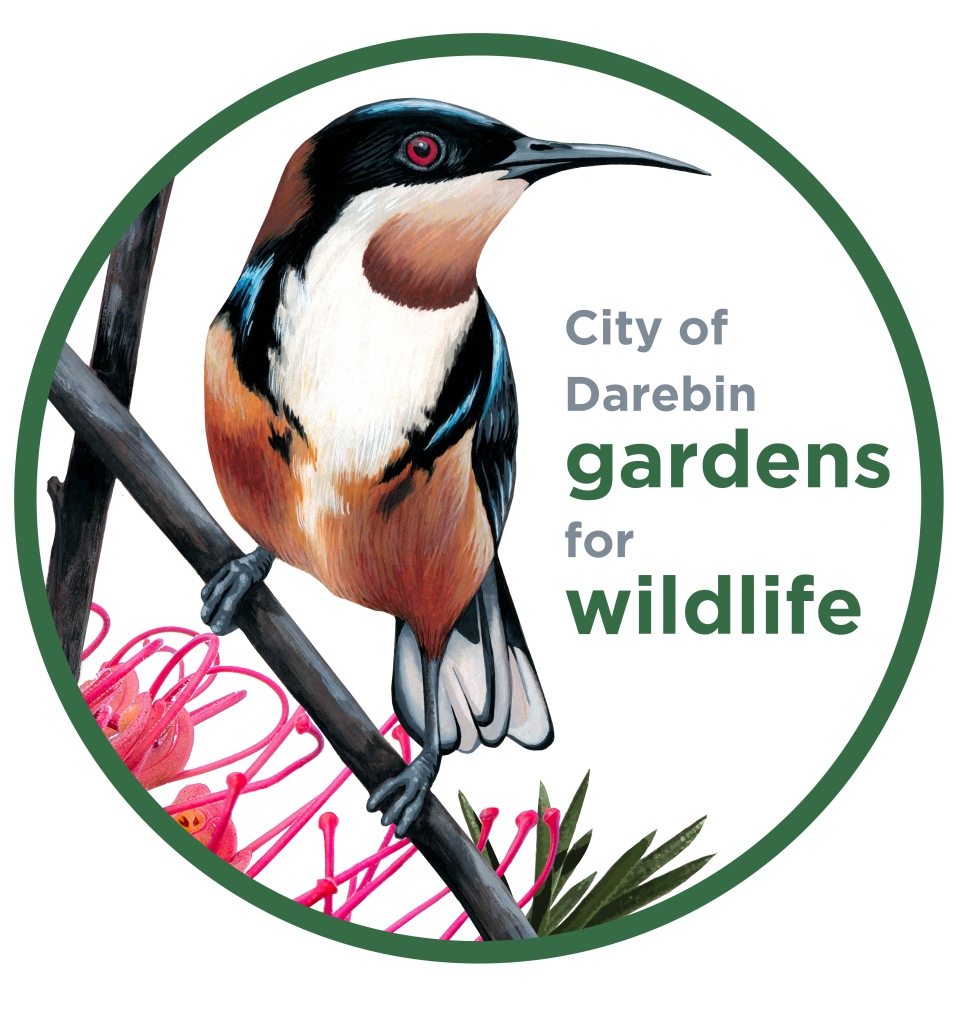Participants in our network include environmental community groups, shires, councils, and volunteers from across Victoria. We are exploring, developing, or managing community wildlife gardening programs that improve habitat for locally native species on private land to support habitat protection and improvement on public land.
AFFILIATES are wildlife gardening programs run by community-council partnerships adhering to our guiding principles.
You may live in areas where our affiliate programs are up and running. These are shown on this MAP. If so, please consider joining. There are also programs in development. If you wish to keep abreast of these, start one of your own, or have a program affiliated with Gardens for Wildlife Victoria please contact us here:
Affiliated programs demonstrate these characteristics:
- involve a local government or agency partnering with community volunteers and environmental groups to design and deliver the program
- practise collaboration and co-design
- recruit and support residents (businesses, schools) to foster native biodiversity
- foster social connections and wellbeing alongside biodiversity objectives
- include face-to-face interaction with program members as part of the program
- are locally sited
- celebrate, monitor and share progress
- use elements of a shared logo
If you would like to begin planning or affiliating a program, there is an Affiliation worksheet you will find helpful here
Participants in our network (affiliates in bold italic) come from Ararat, Ballarat, Banyule, Bayside, Bellarine (Ocean Grove), Boroondara, Brimbank, Cardinia, Casey, Colac Otway, Darebin, Frankston, Glen Eira, Greater Bendigo, Greater Dandenong, Hepburn, Hume, Kingston, Knox, Maroondah, Maribyrnong, City of Melbourne, Mitchell, Monash, Moonee Valley, Moorabool, Moreland, Mornington Peninsula, Portland, Queenscliffe, Nillumbik, Stonnington, Warrnambool, Whitehorse, Wyndham and Yarra Ranges areas. We encourage you to help programs in your area to become Affiliates.
AFFILIATES
Knox Gardens for Wildlife

The Knox Gardens for Wildlife program is designed to encourage Knox residents and businesses to create an area in their garden to support local wildlife.
This can be done by providing habitat planted with locally indigenous, Australian native or suitable introduced species. The program is a partnership between Knox Environment Society and Knox City.
View Inspiring Stories in Knox to see videos of members’ wildlife gardening experiences
Whitehorse Gardens for Wildlife

The City of Whitehorse’s Gardens for Wildlife program is free and designed to support local residents who want to create space in their garden for locally threatened wildlife.
It is a partnership between the City of Whitehorse, Greenlink, and Bungalook Nursery.
Yarra Ranges Gardens for Wildlife

The Yarra Ranges Gardens for Wildlife program is designed to help people create beautiful gardens for native plants and wildlife through education and connection to neighbours.
It is a partnership between Yarra Ranges Council, Southern Dandenongs community nursery, Candlebark Nursery, and Yarra Ranges Landcare Network.
Cardinia Gardens for Wildlife

The Cardinia Gardens for Wildlife Program includes a wildlife garden assessment by a trained volunteer and some great fact sheets to help locals get their gardens on the right track.
It is a partnership between Cardinia Shire, Toomuc Valley Landcare, Maryknoll Progress Association, Bunyip Landcare, Cardinia Environment Coalition, Mount Cannibal Friends Group, Cardinia Catchment Landcare Network and Bessie Creek Landcare.
Frankston Gardens for Wildlife

Frankston Gardens for Wildlife is a free program for residents, providing simple, practical advice on how you can support locally native plants and wildlife in your garden.
The program is hosted by Frankston City Council, supported by community volunteer Garden Guides who visit your property and provide suggestions. Your garden can provide a home for locally native plants. Garden habitat can help to form a corridor or ‘stepping stone’ for wildlife to move between Frankston’s increasingly isolated nature reserves.
City of Melbourne Gardens for Wildlife

Gardens for Wildlife Melbourne is a partnership between the City of Melbourne, Westgate Biodiversity: Bili Nursery & Landcare, and the Melbourne community.
Private landholders manage a similar proportion of land in the municipality as the City of Melbourne; so protection and enhancement of the urban environment by private landholders is critical for achieving healthy ecosystems and thriving biodiversity.
Whether you have a big backyard, a community garden, a school veggie patch, a green rooftop, or pot plants on your balcony, you can provide an area in the garden to promote and support local wildlife. By participating in Gardens for Wildlife Melbourne and becoming engaged in wildlife gardening in the City, you too are helping to boost local nature.
Nillumbik Gardens for Wildlife

Nillumbik Gardens for Wildlife shows you how to create a haven for local wildlife in your own garden in Nillumbik Shire.
The program is a partnership between the community and Nillumbik Shire Council to create habitat gardens that nurture locally native flora and fauna.
The program is free and involves trained volunteer garden guides who provide advice and encouragement to registered participants on increasing habitat and natural food sources for wildlife in their gardens.
Darebin Gardens for Wildlife

Darebin Gardens for Wildlife program is a partnership between Darebin council, the Darebin Nature Trust (an expert advisory group to council) and the Darebin community.
The nature of Darebin is the critically endangered grasslands and grassy woodlands of the Victorian Volcanic Plains, bounded by natural waterways on three sides; Darebin Creek, Merri Creek and the Yarra River. Tree clearing and development are contributing significantly to the heat in Darebin (researchers have identified Reservoir and Preston as among the hottest suburbs in Melbourne) and to the negative impacts of climate change and biodiversity loss.
Our vision is to use native plants and habitat to tackle the climate emergency, the biodiversity emergency and to improve health for all Darebin residents with varied and innovative gardens, including on council and state land, private gardens, naturestrips, schoolyards, planter boxes and vertical gardens. Darebin Gardens for Wildlife is an excellent program to help us achieve our vision and to connect the Darebin community with nature.
Banyule Gardens for Wildlife

Banyule’s Gardens for Wildlife is a free program for the Banyule community, run in partnership between Banyule Council and volunteer community members. It aims to provide advice to households, businesses and schools on how they can create native habitats to enrich biodiversity and support local wildlife.
Trained volunteer guides provide advice, encouragement and support to registered participants, including site visits, on how they can increase native habitat for local animals and insects.
The program also benefits social connections between like minded people who want to connect with nature and share their passion for wildlife gardening together.
